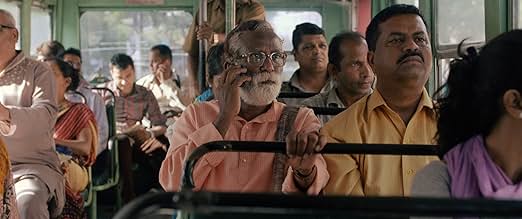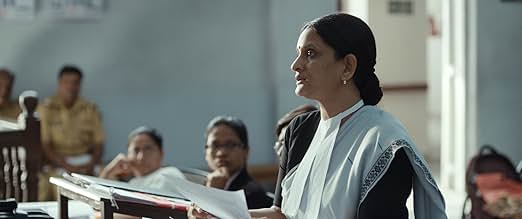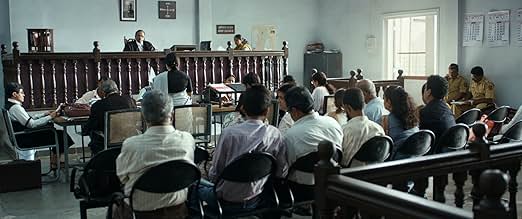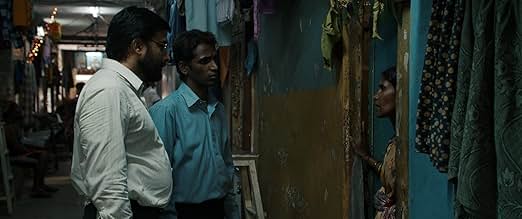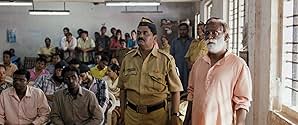Court
- 2014
- 1h 56m
IMDb RATING
7.6/10
5.4K
YOUR RATING
When an aging activist is arrested, the lives of the accused, the lawyers, and the judge intertwine to reveal bigotry that underscores the judicial system.When an aging activist is arrested, the lives of the accused, the lawyers, and the judge intertwine to reveal bigotry that underscores the judicial system.When an aging activist is arrested, the lives of the accused, the lawyers, and the judge intertwine to reveal bigotry that underscores the judicial system.
- Awards
- 21 wins & 10 nominations total
Sukhdas Suryawanshi
- Sukhdev (court staff)
- (as Sukhdas Suryawamshi)
- Director
- Writer
- All cast & crew
- Production, box office & more at IMDbPro
Storyline
Did you know
- TriviaSome cast members were untrained, non-professional actors. In the case of the woman who plays the deceased's widow, it's eerie how unaffected the scene is before you realize that it's reality. (The woman is widowed in real life. Her husband was a manhole worker.)
- SoundtracksDhanya Dhanya Tumhi Sarkar
Written and performed by Sambhaji Bhagat
Featured review
Saw this at the Rotterdam film festival 2015 (IFFR), where it was part of the Bright Future section (and indeed, it deservedly belonged in that section). In short: Very well done, in all respects. We get an inside view in the Indian legal system and also in normal life there, the latter while we follow opposing council and see how they live outside the court. And in the final scene, when the case is all over, we also follow the judge on a family trip. This final scene is somewhat detached from the core story, but its purpose becomes clear when seeing the judge on a holiday trip in family circles. It seemed a loose end, but fits nicely in the setup, after all.
The Indian legal system is portrayed very well and (as far as I can see) objectively, not leaving a bad impression behind. Prosecution and defense council act believably and competently, and each gets their say. The judge on his side goes strictly by the book. That being his role in the proceedings, I have no problem with him either. The police force is portrayed less positive, if not merely incompetent, showing tunnel vision when locating suspects and witnesses. Interestingly, typically Indian I assume, we see laws quoted from the colonial age. This is remarkable but apparently a fact of contemporary Indian life. And, as judge agrees with prosecution, it IS current law hence applies in this case. In the final Q&A, the director confirms that many laws are outdated, requiring interpretation to establish what they really mean nowadays.
I noted two loose facts from the Q&A. Firstly, the slum area we see when one of the witnesses is brought back to her family, looks true to reality. Nearly demolished places like that coexist in the same city. Secondly, as far as the actors are concerned, we learn that 90% was non-professional. For that reason, Narayan's songs are playbacked.
To conclude: Some people in Western countries may find nearly two hours running time overly long, but it did not feel that way. I think that is caused by mixing court scenes with family scenes outside the court room. As such, we see the formal proceedings indoors next to what happens outdoors in personal lives of councils and judge. Intermixing these two worlds works very well. Indeed, the story seems to drag some of the time, just like the actual court case does, but it did not hinder me at all, as there were ample developments, and last-but-not-least interesting local folklore that we would never had the chance to see if not through this movie.
The Indian legal system is portrayed very well and (as far as I can see) objectively, not leaving a bad impression behind. Prosecution and defense council act believably and competently, and each gets their say. The judge on his side goes strictly by the book. That being his role in the proceedings, I have no problem with him either. The police force is portrayed less positive, if not merely incompetent, showing tunnel vision when locating suspects and witnesses. Interestingly, typically Indian I assume, we see laws quoted from the colonial age. This is remarkable but apparently a fact of contemporary Indian life. And, as judge agrees with prosecution, it IS current law hence applies in this case. In the final Q&A, the director confirms that many laws are outdated, requiring interpretation to establish what they really mean nowadays.
I noted two loose facts from the Q&A. Firstly, the slum area we see when one of the witnesses is brought back to her family, looks true to reality. Nearly demolished places like that coexist in the same city. Secondly, as far as the actors are concerned, we learn that 90% was non-professional. For that reason, Narayan's songs are playbacked.
To conclude: Some people in Western countries may find nearly two hours running time overly long, but it did not feel that way. I think that is caused by mixing court scenes with family scenes outside the court room. As such, we see the formal proceedings indoors next to what happens outdoors in personal lives of councils and judge. Intermixing these two worlds works very well. Indeed, the story seems to drag some of the time, just like the actual court case does, but it did not hinder me at all, as there were ample developments, and last-but-not-least interesting local folklore that we would never had the chance to see if not through this movie.
- How long is Court?Powered by Alexa
Details
Box office
- Gross US & Canada
- $22,898
- Opening weekend US & Canada
- $4,806
- Jul 19, 2015
- Gross worldwide
- $57,416
Contribute to this page
Suggest an edit or add missing content







